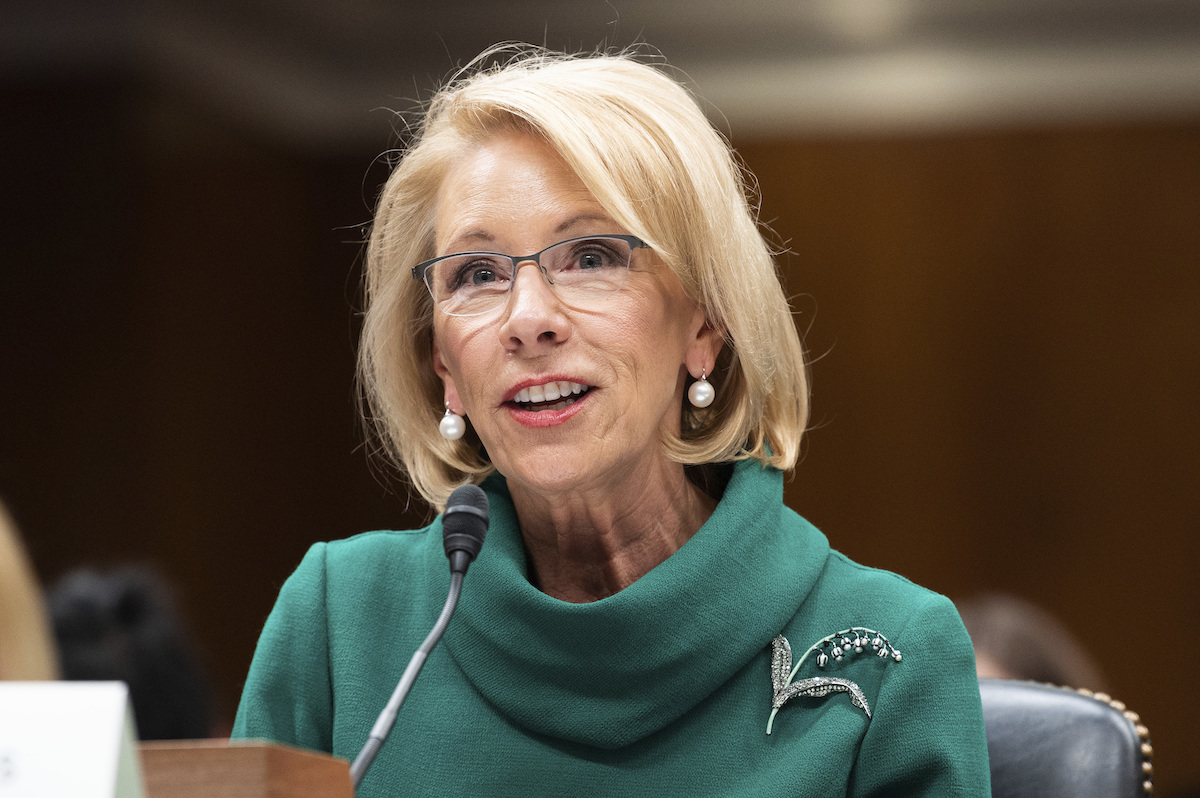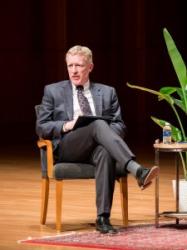Betsy DeVos thinks the Department of Education “should not exist.” She’s not the first secretary of education we’ve had who understood her central purpose to be the dissolution of the agency of which she was in charge (until she resigned on January 7, 2021). Ronald Reagan famously pledged the elimination of the office when he ran for president in 1980, promising to undo Carter’s “boondoggle.” Terrel Bell, Reagan’s first secretary of education, insisted that the department should be turned into a foundation, and thus placed under the control of the private sector. Once Bell got wobbly on his commitment to eliminate the agency, Reagan turned control over to William Bennett, who actively called for the department’s elimination.
Reagan’s appointment of Bennett to run the agency pointed to a central paradox of modern government: Bureaucratic gains are irreversible, and as a result electoral politics become an intense competition for control of the bureaucratic apparatus. Conservatives could not eliminate the department they loathed, but they could support a secretary who at least seemed sympathetic to their interests.
It’s in the nature of the idea of “public education” that it will conflict with private ends. Parents are the first and thus primary educators of their children. The only way to bypass this would be to separate infants from their parents at birth, the path suggested by Socrates when he reflected on the proper formation of the guardian class. In Socrates’ ideal city, well-bred children would be placed in the care of nurses whose sole commitment is to the good of the city.
While it is true that American constitutionalism asked for a well-educated citizenry, the request could never be entertained apart from the demands of liberty and the interests of both households and communities to maintain their independence. Education in America stressed both practical competency and mastery of arts and letters, and this emphasis was always connected to principles of freedom.
As America transformed itself from a Republic of republics to a nation of consequence, the demand for more state control of education increased as well, bringing with it a seismic shift in our understanding of what the schools are, what role they ought to play, and on what principles education ought to be conducted.
Consider, for example, the educational reforms of Horace Mann, who argued vigorously for government-supported common schools that would bring all children into the nation. Mann stressed three previously contestable aspects of public education: It had to be compulsory, it had to be universal, and it had to be managed by a centralized bureaucracy. Mann cloaked his understanding of public education in religious language, frequently referring to schools as sacred temples or places where, Christ-like, little children were being called to participate in the kingdom of heaven. Clearly schooled in the Bible and Calvinist theology, Mann sought to connect these to life in a democratic society, whose futurity required “comprehensive organization and … united effort, acting for a common end and under the focal light of a common intelligence.” Mann viewed local governments as essential “bunglers” who couldn’t move education toward its goal of ensuring national progress. Parents, likewise, were benighted educators who had only a minimal claim to their child’s development. Parents had their children for only a short period of time, after which they would be bequeathed to society as adults. If parents do a bad job with the children, society pays the price. Better, Mann averred, that society intervene early in the process, protect the child from bad parenting, and ensure, via standardized school systems, the production of moral and intelligent adults. One can’t bend an oak, he said, but one can move a seed.
We see a similar emphasis in the development of the National Education Association, the main client connected to DoE policy and largesse. By 1918, the NEA insisted that schools be able to reach their authority back into the home and reform it, since the home was often a bastion of backwardness, ethnic division, and benightedness. The student could then be charged with carrying the ethos of the state back into the household for the purpose of standardizing households.
Such standardization is the key to educational reform in the 20th century. The increase in centralized state authority found its handmaiden in the emergent social sciences, with their emphases on methods, aggregation of populations, and categorization, the last of which tended to see things only as species. These emphases can clearly be found in contemporary education, with the foci on standardized tests, measurable outcomes, and universal curricular guidelines.
This nationalization and standardization received more formal status with the creation of the Department of Education in 1980, whose task it was to nationalize education through data collection and research. The department has not only grown in size since its inception but also has grown to dominate the nation’s educational landscape by using funds to entice schools to pursue both “benchmarks” and, more damningly, social reform. The emphasis on STEM to the exclusion of humane learning serves America’s position as a competitor in the local marketplace, and social reform and identity politics provide moral cover. Bureaucrats driven by the current social science research substitute their judgment for that of teachers and parents.
Clearly DoE has taken center stage in the culture wars (consider the 2011 “Dear Colleague” letter as an example) and been a central actor in using the coercive power of federal funding to force compliance around a set of cultural markers and expectations. It has certainly not been immune from using its influence to advance a progressive agenda and identity politics. One would expect parents to push back against this.
Secretary DeVos’ tenure was not without controversy, but also not without significant successes, even if eliminating the department wasn’t one of them. Rolling back the open attacks on due process on our college campuses was a significant albeit short-lived achievement. And I’d be remiss not to mention my favorite moment of her administration: threatening to withhold federal funds from Princeton University after the school issued an opportunistic and disingenuous admission of systemic racism. Just slowing down the progressive agenda was no mean feat.
And while I can’t speak for Secretary DeVos, my guess is that she rightly divines that such successes will last only as long as conservatives hold some kind of power; and that, furthermore, the internal logic of centralized bureaucratic enterprises will always be progressive, in no small part because the roughly 4,400 employees of that department are overwhelmingly progressive in their views. But even if they weren’t, the animating principle of the enterprise is to replace parents with teachers, experience with expertise, and local control with national objectives. These national objectives, in turn, are often contrary to the interests and well-being of local communities, particularly when those objectives have an economic or military hue. It may be in the interest of the state to sacrifice citizens in war, but it’s never in the interest of the parent, and that’s true whether it’s a war of a military or a cultural variety.

